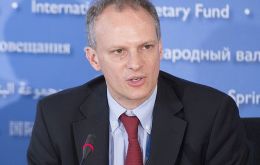MercoPress. South Atlantic News Agency
Tag: Latam economy
-
Thursday, October 8th 2015 - 10:21 UTC
With Brazil contracting 3%, Latin America's economy will shrink 0.3%, says IMF report

The International Monetary Fund said today that it now expects Latin America's economy to shrink 0.3% this year instead of growing 0.5%, largely due to a steep recession in Brazil and slumping commodity prices. It would be the first recession for the Latin American and Caribbean region since 2009.
-
Friday, July 10th 2015 - 07:44 UTC
IMF sharply lowers Latin America's growth for 2015 and 2016, as commodities' prices plunge

The International Monetary Fund sharply lowered its growth forecast for Latin America and the Caribbean to 0.5% in 2015 and 1.7% next year, citing lower commodity prices and China's transition to a new growth model. The figures are down from the IMF's April projections for 0.9% growth this year and 2% next year.
-
Wednesday, April 22nd 2015 - 06:03 UTC
Understanding the drivers of prosperity in Latin America and the Caribbean

A new World Bank Group report, “Shared Prosperity and Poverty Eradication in Latin America and the Caribbean”, explores the performance of eight countries to understand what has driven progress, and what it will take to sustain it.
-
Tuesday, January 6th 2015 - 06:58 UTC
Optimistic forecast for Latin America: 2.2% growth in 2015, up from 1.3% in 2014

Latin America and the Caribbean's economic growth might recover modestly to 2.2% in 2015, up from 1.3% in 2014, its lowest rate since last decade's global financial crisis. Despite the slowdown, the region has managed to maintain its gains against poverty, said Inter-American Development Bank President Luis Alberto Moreno.
-
Wednesday, December 17th 2014 - 12:22 UTC
Latin America exports stagnant for third year running, says IDB

Exports from Latin America will drop by about 1.4% in 2014, the first decline in exports since the collapse of international commerce during the 2009 financial crisis, according to a study by the Inter-American Development Bank (IDB).
-
Monday, December 8th 2014 - 07:12 UTC
Road ahead for Latin America 'increasingly bumpy' says IMF Lagarde

Latin America faces a rocky road ahead despite social and economic achievements in recent years, according to the head of the International Monetary Fund Christine Lagarde. Among the achievements in the last two decades and in most nations, Ms Lagarde mentioned low inflation, fiscal discipline, and financial stability.
-
Thursday, October 16th 2014 - 07:30 UTC
Venezuela 'ripe' for default on foreign debt forecast Reinhart and Rogoff

Venezuela will almost certainly default on its foreign debt, according to Harvard economists Carmen Reinhart and Kenneth Rogoff. They add that the beleaguered Latin American economy has already defaulted on “every conceivable kind of domestic debt”.
-
Friday, May 23rd 2014 - 23:42 UTC
ECLAC/ILO anticipate less job creation in Latam as the overall economy slows down

The economic scenario for 2014, with an estimated average growth rate of 2.7%, is far from encouraging for the evolution of the Latin American regional labor market and presents major challenges for labor market policy, said the Economic Commission for Latin America and the Caribbean (ECLAC) and the International Labor Organization (ILO) in a new joint report released this week.
-
Monday, May 5th 2014 - 06:24 UTC
“Least difficult phase of economic growth is now over”, IMF top official tells Latam

IMF Director for the Western Hemisphere Department Alejandro Werner has once again called on Latin America to embark upon economic reforms, claiming that the “least difficult” phase of economic growth is now over.
-
Friday, April 25th 2014 - 05:36 UTC
Latin America's fast growing decade is coming to an end, anticipates IMF report

The IMF’s Regional Economic Outlook for the Western Hemisphere, released on Thursday in Lima, Peru, projects regional growth of 2½ percent in 2014, down from 2¾ percent in 2013. Weak investment and subdued demand for the region’s exports held back activity in 2013, as did increasingly binding supply bottlenecks in a number of economies. For 2015, the IMF projects a modest pickup, to 3%.
